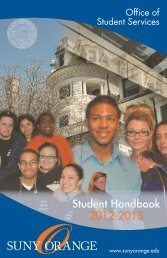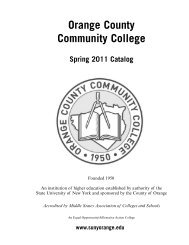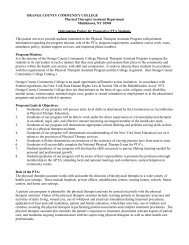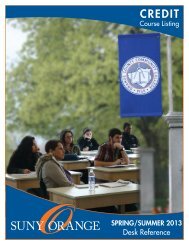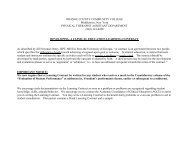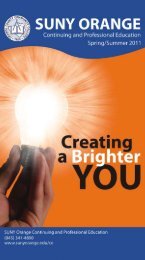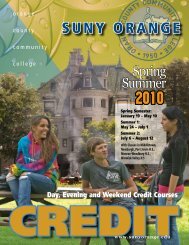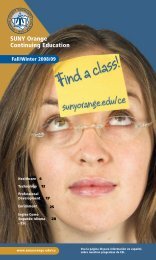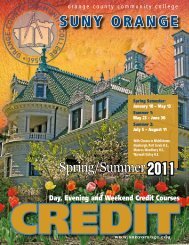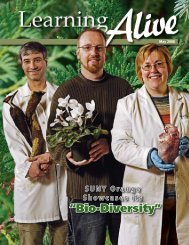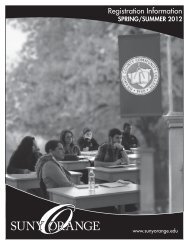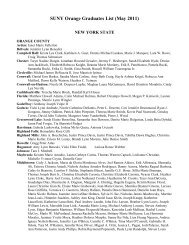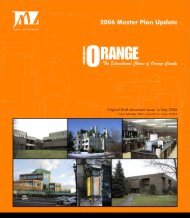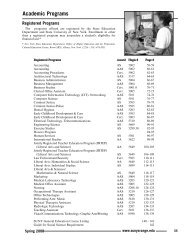Create successful ePaper yourself
Turn your PDF publications into a flip-book with our unique Google optimized e-Paper software.
Engineering Science<br />
Degree Awarded: Associate in Science<br />
Recommended Course Sequence<br />
First Semester-Fall<br />
Credits<br />
ENG 101 Freshman English 1 3<br />
CHM 105 General Chemistry 1 4<br />
PHY 103 Physics for Science & Eng. 1 4<br />
MAT 205 Calculus 1 4<br />
EGR 101 Engineering 1 3<br />
PES 100 Concepts of Physical Wellness 1<br />
Second Semester-Spring<br />
ENG 102 Freshman English 2 3<br />
PHY 104 Physics for Science & Eng. 2 4<br />
CHM 106 General Chemistry 2 4<br />
MAT 206 Calculus 2 4<br />
EGR 102 Engineering 2 3<br />
PES ____ Physical Education (two) 1<br />
Third Semester-Fall<br />
________ <strong>SUNY</strong> Social Science (GE 3) 3<br />
PHY 203 Physics for Science & Eng. 3 4<br />
MAT 207 Calculus 3 4<br />
EGR 205 Mechanics 1 (Statics) 4<br />
________ Engineering Elective 3<br />
Fourth Semester-Spring<br />
_______ <strong>SUNY</strong> American History (GE 4) 3<br />
MAT 214 Differential Equations &Series 4<br />
EGR 206 Mechanics 2 (Dynamics) 4<br />
________ Engineering Elective 3<br />
________ Engineering Elective 2/3<br />
Total Credits: 72-73<br />
Note: Students must take a minimum of three courses<br />
(eight credits) from the following depending on their<br />
area of specialization:<br />
Thermodynamics (EGR 214) summer<br />
Solid Mechanics (EGR 220) spring<br />
Circuit Theory (EGR 212) spring<br />
Modern Physics (PHY 204)<br />
Materials Science (EGR 218) fall<br />
Linear Algebra (MAT 209) fall/summer<br />
Engineering Computations (EGR 216)<br />
Students majoring in chemical, biological or environmental<br />
engineering should plan to take:<br />
Organic Chemistry I (CHM201) and<br />
Organic Chemistry II (CHM202)<br />
Computer Engineering majors should take:<br />
Computer Science II (CSC 102) and<br />
Data Structures (CSC 201).<br />
(Organic Chemistry II or Data Structures may be<br />
substituted for Mechanics II with the permission of the<br />
department chair.) Proper advising is crucial for proper<br />
course selection.<br />
Program Description<br />
The Associate in Science degree program in Engineering<br />
Science is designed specifically to enable students to<br />
transfer, with junior status, to the upper-level engineering<br />
college or university of their choice, where they can<br />
complete the Bachelor of Science degree in Engineering. As<br />
such, the program provides the same core courses that<br />
would be encountered in the first two years of study at most<br />
four-year institutions offering engineering degrees in the<br />
following disciplines:<br />
• Aeronautical Engineering<br />
• Architectural Engineering<br />
• Biological Engineering<br />
• Chemical Engineering, ChE<br />
• Civil Engineering, CE<br />
• Computer Engineering<br />
• Electrical Engineering, EE<br />
• Environmental Engineering<br />
• Geological Engineering<br />
• Materials Engineering<br />
• Mechanical Engineering, ME<br />
• Nuclear Engineering<br />
Core courses in calculus, chemistry, engineering physics<br />
and engineering science constitute the nucleus of this<br />
program. Selected courses in the liberal arts support and<br />
enhance this central core.<br />
To begin the two year program, students must be at the<br />
mathematical level of Calculus 1 (MAT 205) or must have<br />
completed either College Trigonometry* (MAT 122) or<br />
Pre-Calculus Mathematics* (MAT 131).<br />
Students who do not meet the above requirements should<br />
not be discouraged. Many students, who have either missed<br />
some foundational courses or who have family/job<br />
commitments, opt to take the extended program, which<br />
prepares them for Calculus 1 (MAT 205). Although this<br />
path will require more than four semesters, it enables<br />
students to reach their educational goal and to work as<br />
professional engineers in the above-mentioned fields.<br />
Students taking the extended option should meet with their<br />
advisor to arrange a planned course of study.<br />
The Engineering Science program at <strong>SUNY</strong> <strong>Orange</strong><br />
strives to form a student's ability to think critically in real<br />
time, to develop a professional work ethic built on<br />
cooperation and group problem solving, and to provide the<br />
rigorous conceptual and ethical framework required in a<br />
field where professional competence is expected.<br />
*These prerequisite courses may be taken in the summer.<br />
102 www.sunyorange.edu Spring 2012



